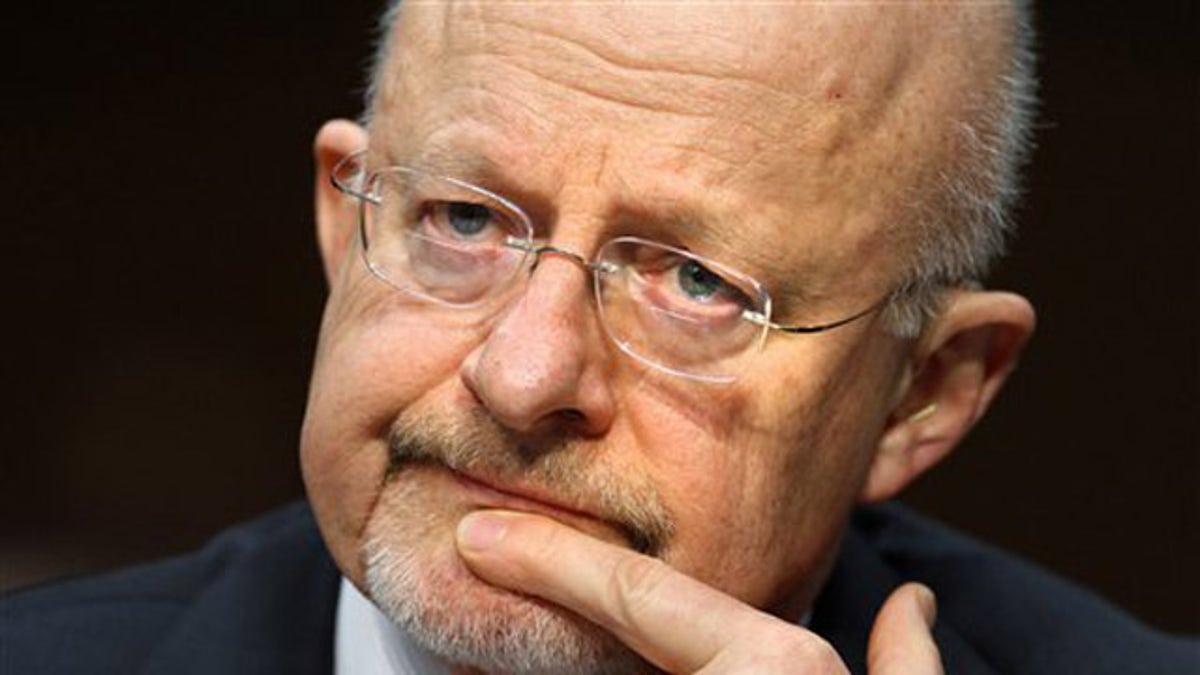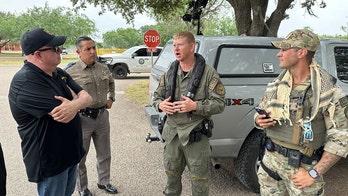
FILE: Jan. 31, 2012: Director of National Intelligence James Clapper listens to a question while testifying on Capitol Hill in Washington, D.C. (AP)
WASHINGTON – The nation's top intelligence adviser told Congress on Thursday that Al Qaeda "is extending its reach into Syria" -- possibly with Iran's help.
In a rare public admission, Director of National Intelligence James Clapper said Al Qaeda and the Iranian regime have a "shotgun marriage, or marriage of convenience." More significantly, given the series of attacks this week linked to Iran, Clapper said Tehran appears to see Al Qaeda as an insurance policy -- a "surrogate or proxy" -- against future Western aggression.
This public confirmation comes as U.S. officials investigate the release of five Al Qaeda members after "years of house arrest" in Iran. The men include Saif al-Adel, who was tipped as the likely replacement for Usama bin Laden.
The release of Al Qaeda leaders is not confined to Iran. U.S. officials are also investigating whether the Syrians released Abu Musab al-Suri, seen as one of the terror network's most important strategists. Al-Suri was captured in Pakistan 2005 and was in CIA custody until he was sent back to Syria as part of the controversial rendition program. Until recently, US officials were confident he would not be released by the Syrian government.
Clapper also confirmed that U.S. officials believe an Al Qaeda affiliate was responsible for a series of blast in Syria because the car bombs "bore the earmarks" of Al Qaeda in Iraq. The affiliate, written off by some members of the U.S. intelligence community, has made a comeback according to Clapper.
Al Qaeda of Iraq is one of Al Qaeda's largest regional affiliates, and it "is extending its reach into Syria" by infiltrating opposition groups, likely without their knowledge. Clapper said the lack of a unified opposition group could leave a power vacuum that extremists could fill if the Syrian government falls, a potential development he called "troubling," because Syria has an extensive network of chemical weapons sites.
Defense Intelligence Agency chief Lt. Gen. Ronald Burgess added that it appears "the Al Qaeda like attacks" were likely caused by elements already inside the country, and that the U.S. intelligence community had not yet detected "a clarion call to outsiders" to join the cause.
He made no mention of the video released by core Al Qaeda leader Ayman al-Zawahri over the weekend, calling on Muslims to support Syrian rebels.
The officials also told Congress that if Iran is attacked over its alleged nuclear weapons program, it could respond by closing the Strait of Hormuz to ships and launch missiles at regional U.S. forces and allies.
Burgess tells senators Iran is unlikely to initiate or intentionally provoke a conflict.
Clapper says it is "technically feasible" that Tehran could produce a nuclear weapon in one or two years, if its leaders decide to build one, "but practically not likely."
He says recent diplomatic outreach by Iran to European diplomats could indicate that officials there are reconsidering the program.
Both men say they do not believe Israel has decided to strike Iran. Clapper said he would be meeting with Israeli officials soon to discuss the matter.
Fox News' Catherine Herridge and the Associated Press contributed to this report.




